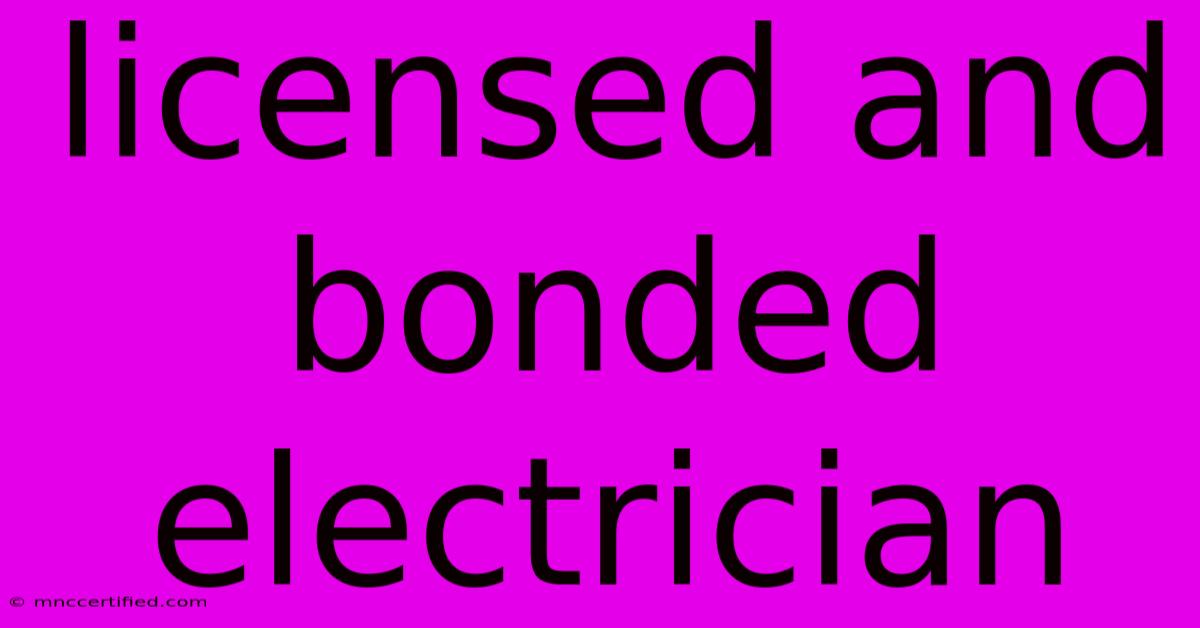Licensed And Bonded Electrician

Table of Contents
Licensed and Bonded Electrician: Why You Need One for Your Electrical Projects
Finding a reliable electrician is crucial for any electrical project, big or small. But what exactly does it mean when an electrician is "licensed and bonded"? Understanding this distinction is vital for ensuring your safety and protecting your investment. This comprehensive guide will explain the importance of hiring a licensed and bonded electrician, the differences between licensing and bonding, and how to find a reputable professional.
What Does it Mean to be a Licensed Electrician?
A licensed electrician has passed a rigorous examination and met specific requirements set by their state or local government. This licensing process demonstrates competency and adherence to safety standards. Key benefits of hiring a licensed electrician include:
- Safety: Licensed electricians are trained to work safely with electricity, minimizing the risk of electrical shocks, fires, and other hazards. This is paramount for protecting your home and family.
- Compliance: They understand and comply with all local building codes and regulations, ensuring your electrical work is legal and up to code.
- Insurance: Many licenses require carrying liability insurance, offering an additional layer of protection in case of accidents or damage during the work.
- Quality Workmanship: The licensing process often involves demonstrating a level of skill and experience, assuring higher quality work.
- Problem Solving: Licensed electricians possess the knowledge to diagnose and solve a wider array of electrical problems.
Finding a license: You can typically verify a contractor's license through your state's licensing board website. Simply search "[your state] electrician license lookup" to find the appropriate resource.
What Does it Mean to be a Bonded Electrician?
Being bonded means the electrician has purchased a surety bond. This bond acts as a financial guarantee to protect you, the homeowner, from financial loss if the electrician performs substandard work or fails to complete the job. The bonding company will cover the costs of rectifying the problem up to the bond amount. This offers a crucial safety net beyond the protection a license provides.
Key differences between licensing and bonding: A license proves competency and adherence to standards, while a bond offers financial protection against potential losses. While not all states mandate bonding for electricians, it's a strong indicator of professionalism and commitment to customer satisfaction.
Why You Should Always Choose a Licensed and Bonded Electrician
Hiring a licensed and bonded electrician offers peace of mind. You are protected from potential hazards, ensure your work meets legal standards, and have recourse if something goes wrong. Choosing a less qualified electrician could lead to:
- Electrical fires: Faulty wiring or improper installations are major fire hazards.
- Electrical shocks: Improper work increases the risk of serious injury or even death.
- Code violations: Non-compliant work can lead to costly repairs and potential fines.
- Voiding insurance: Insurance companies may refuse claims for damage caused by unqualified electrical work.
- Financial losses: Substandard work can require costly repairs or replacements.
How to Find a Reputable Licensed and Bonded Electrician
Finding the right professional involves more than just searching online. Here's a step-by-step approach:
- Online Search: Use search terms like "licensed and bonded electrician near me," "best electricians [your city/state]," or "residential electrician [your zip code]".
- Check Reviews: Carefully review online testimonials and ratings on platforms like Yelp, Google My Business, and Angie's List.
- Verify Credentials: Always independently verify the electrician's license and bond through the appropriate state or local authority.
- Get Multiple Quotes: Obtain at least three quotes before making a decision. Compare pricing, services offered, and guarantees provided.
- Ask Questions: Don't hesitate to ask about their experience, licensing, bonding, insurance, and the process they will follow.
- Check References: Ask for references and contact previous clients to inquire about their experiences.
Choosing a licensed and bonded electrician is an investment in safety and peace of mind. By following these steps, you can ensure your electrical project is completed safely, efficiently, and to the highest standards. Don't compromise on safety – always hire a qualified professional.

Thank you for visiting our website wich cover about Licensed And Bonded Electrician. We hope the information provided has been useful to you. Feel free to contact us if you have any questions or need further assistance. See you next time and dont miss to bookmark.
Featured Posts
-
1947 Bond Bread Jackie Robinson
Nov 23, 2024
-
Trumps Attorney General Choice Bondi
Nov 23, 2024
-
Charlotte Crosby Burglary Sunderland Home Targeted
Nov 23, 2024
-
Bayern Vs Augsburg Intense Period Starts
Nov 23, 2024
-
Augsburg Vs Bayern 3 0 Victory Analysis
Nov 23, 2024